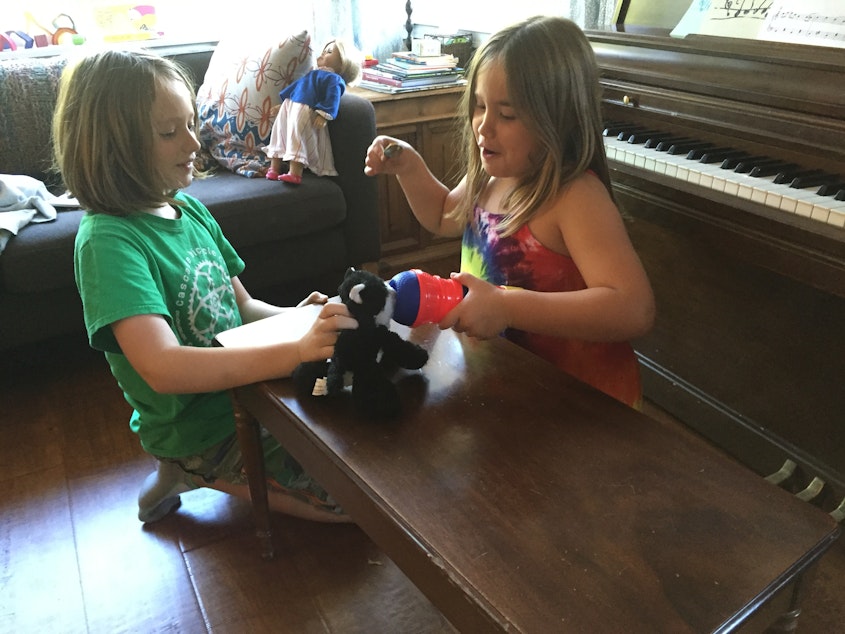No more homework, say many Seattle elementary schools

Many Seattle elementary schools are doing away with homework this fall, citing a growing body of evidence that take-home assignments tend not to help elementary and middle school students.
Seven-year-old Rilo is a first-grader at Whittier Elementary in Ballard, where the school year began with an announcement from the principal that the teachers had voted to do away with nearly all homework.
Rilo says she actually enjoyed the math packets she took home from kindergarten last year, "mostly pluses and equals," so she greeted the news with ambivalence. "I was sad because I wanted to do it still, but I was excited because I’d have more time to play," Rilo said.
On a recent afternoon, Rilo was playing in the kitchen with ingredients that she'd mixed into an improvised pancake batter that she planned to bake, as mom Sascha Demerjian looked on. Demerjian said she was delighted by the school's new homework policy.
"Anything that can allow us to have a less-busy life, I will happily receive," Demerjian said. "I don’t know that [homework] was doing anything particularly useful for her." Instead, Demerjian said, most of her kids’ assignments were usually busywork – it was fun for them, but mostly because it was easy.
Sponsored
Therein lies the homework paradox, said Whittier Principal Melissa Schweitzer. "The kids who love to do homework will always do it, and the kids who don’t are always going to struggle with it."
Over the summer, Schweitzer said, a special education teacher at her school proposed the new policy after reading the research about homework in the early grades, and hearing from parents about how much conflict homework created at home.
For other families, Schweitzer said, the battles may not arise – but not necessarily because the homework is working.
“Homework is just another equity issue for kids. Kids who have parents at home who can help them and do that time management and sit through that worksheet, they can do that," Schweitzer said.
"But there are a lot of families who don’t have that ability. Either English isn’t their first language. Or they’re working late and they’re just not available to do that."
Sponsored
Schweitzer loved the idea of jettisoning homework, and so did her teachers when they discussed it at a staff meeting. The teachers debated whether to limit the homework to just certain types, or grade levels, but eventually, they decided it was all-or-nothing.
Then they voted.
"I’ve been here for five years and it was the first time we’ve unanimously voted on something," Schweitzer said.
The no-homework trend is hot right now across the country, with recent research showing that most homework doesn’t really help kids until high school. An elementary school teacher in Texas sent a letter home in August telling parents she was kicking homework to the curb. It went viral.
Pretty soon, elementary schools across Seattle were announcing that they are doing away with most or all homework this year. Some schools still require that students read for 30 minutes a night, or that students bring home work they haven’t finished in class.
Sponsored
Schools in wealthier, primarily white neighborhoods appear more likely to have no-homework policies – or to make fewer exceptions. In schools that haven't developed a blanket homework policy, many teachers have done away with homework on their own.
Still, some parents see homework as vital, even in elementary school.
Kate Kochergina said her kids have homework from elementary school, as well as language assignments from their weekend Russian school. Still, she said, their homework load is nothing compared to what she had to do every night growing up in Russia.
"We had literature which we were supposed to read, a poem which we were supposed to memorize, Russian, science, and math," Kochergina said.
Although Kochergina said she doesn’t want homework to take up her kids’ entire evening, she said some teachers don’t give kids nearly enough homework.
Sponsored
"In the future, in high school or in college, they need to learn by themselves," Kochergina said. "I think it’s good to start early to get that as a habit for a child. It’s like a chore in the house."
Schweitzer said that was one of the concerns Whittier teachers voiced before they got rid of homework. They’ve also heard worries from parents about their kids not developing study habits. But Schweitzer said there are other ways to help kids transition to middle school.
"Let them be kids while they still are. Those responsibilities will come," Schweitzer said. "We are giving the sixth-grade teachers a much greater gift of a strong foundation of knowledge and a love of learning so that the rest will happen as it should."
Because many parents value homework as a means of keeping tabs on what their children are learning, Schweitzer said teachers decided to reallocate some of the time they put into homework into communicating with parents about what their kids are doing in school.
Overall, parents appear to be welcoming schools' no-homework policies with open arms.
Sponsored
Sascha Demerjian said it’s been great for her family.
"We expect a lot of our kids," she said. "They could end up with very busy lives. The one thing kids really need is unstructured play time to explore, and learn about themselves, and problem-solve, and that’s one more nudge in that direction."
Besides, she said, even an afternoon spent whipping up mystery batter in the kitchen can have some surprise math and science lessons baked in.

